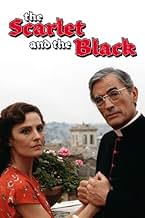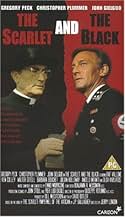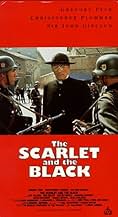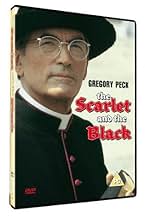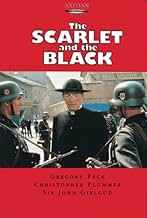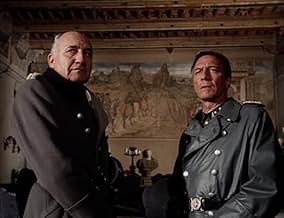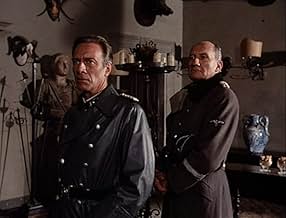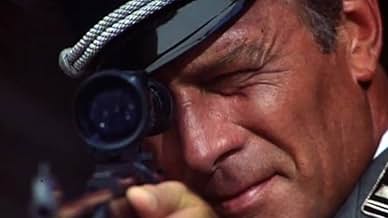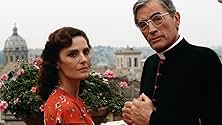1943, Le pape Pie XII ne prend pas part au conflit qui déchire l'Europe. Or Monseigneur O'Flaherty, use de son immunité diplomatique pour cacher des prisonniers de guerre. Le colonel Kappler... Tout lire1943, Le pape Pie XII ne prend pas part au conflit qui déchire l'Europe. Or Monseigneur O'Flaherty, use de son immunité diplomatique pour cacher des prisonniers de guerre. Le colonel Kappler, chef de la Gestapo de Rome, le soupçonne.1943, Le pape Pie XII ne prend pas part au conflit qui déchire l'Europe. Or Monseigneur O'Flaherty, use de son immunité diplomatique pour cacher des prisonniers de guerre. Le colonel Kappler, chef de la Gestapo de Rome, le soupçonne.
- Réalisation
- Scénario
- Casting principal
- Récompensé par 1 Primetime Emmy
- 1 victoire et 2 nominations au total
- Pope Pius XII
- (as Sir John Gielgud)
- Capt. Hirsch
- (as Ken Colley)
Avis à la une
This story is inspired on actual facts and based on the nonfiction novel titled ¨The Scarlet Pimpernel of the Vatican¨ by J.P.Gallaher. This interesting story drags in some place but is well realized and contains good cinematography by Giuseppe Rotunno and excellent musical score by Ennio Morricone. It's a lavish production by Bill McCutchen , an ITC-RAI Radiotelevisione Italiana Co-production for world distribution, well filmed by Jerry London entirely on location in Rome.
The real events are the following : In the early years of World War II, O'Flaherty (Gregory Peck)toured prisoner of war camps in Italy and tried to find out about prisoners who had been reported missing in action.When Italy changed sides in 1943, thousands of British POWs were released. Some of them (John Terry), remembering visits by O'Flaherty , reached Rome and asked him for help. O'Flaherty did not wait for permission from his superiors. He recruited the help of other priests (Raf Vallone, Angelo Infanti), and a Swiss count (Vernon Dobtcheff). He also kept contact with Sir D'Arcy Osborne (Peter Burton), British Ambassador to the Vatican. O'Flaherty and his allies concealed 4,000 escapees − Allied soldiers and Jews − in flats, farms and convents. One of the hideouts was beside the local SS headquarters. O'Flaherty coordinated all this and when he was visiting outside the Vatican, he wore various disguises.The German occupiers of Rome commanded by Col. Herbert Kappler (Christopher Plummer) under orders of Reichsfuhrer Heinrich Himmler (T. P. McKenna) tried to stop him and eventually they found out that the leader of the network was a priest.His efforts put him at odds with the Pope Pius XII (John Gielgud) and SS attempts to assassinate him failed. They found out his identity, but could not arrest him inside the Vatican. When the German ambassador revealed this to O'Flaherty, he began to meet his contacts on the stairs of the St. Peter's Basilica.Several others, including priests, nuns and lay people, worked in secret with Msgr. O'Flaherty, and even hid refugees in their own private homes around Rome. Another person who contributed significantly to this operation was the Malta-born widow Chetta Chevalier (Olga Karlatos), who hid some refugees in her house with her sons (Fabiana Udenio), and was lucky to escape detection. When the Allies arrived in Rome in June 1944, 3,925 of the escapees were still alive. O'Flaherty demanded that German prisoners be treated properly as well. He took a plane to South Africa to meet Italian POWs and to Jerusalem to visit Jewish refugees. Of the 9,700 Jews in Rome, 1,007 had been shipped to Auschwitz. The rest were hidden, 5,000 of them by the official Church − 3,000 in Castel Gandolfo, 200 or 400 as "members" of the Palatine Guard and some 1,500 in monasteries, convents and colleges. The remaining 3,700 were hidden in private homes. After liberation Monsignor O'Flaherty was honored by Italy, Canada and Australia given the US medal of Freedom and made a Commander of the British Empire. Herbert Kappler was sentenced to life imprisonment for war crimes. In the long years that followed in his Italian prison, Kappler had only one visitor. Every month, year in and year out, O'Flaherty came to see him. In 1959, the former head of the dreaded Gestapo in Rome was baptized into the Catholic faith at the hand of the Irish priest.
John Gielgud makes a very convincing Pope Pius XII. Sir John aged very gracefully giving him that perpetual angelic half smile on that kind face. Contrast this to the fact that we remember him well as the blackguard Casca in Julius Caesar (with James Mason and Marlon Brando). As Pius XII, Gielgud portrays the late Pope as torn between his duty to ensure the safety of the Church and Catholics and the necessity of actively participating in rescuing the Jews of Europe lest that provoke the Nazis towards more brutalities. The recently released Actes et Documents du Saint Siege relatiffs a la Guerre Mondiale Seconde (Acts and Documents of the Holy See relative to WWII or ADSS) reveal that the Holy See saw a relation between increased persecution of both Jews and Catholics, especially the religious orders, every time Pius XII spoke against the Nazis. It also disclosed that Jewish leaders, both in and out of Nazi Germany, advised the Pope to speak and act more discreetly because of this.
Gregory Peck is, as usual, dignified, likable and very convincing as a brave Catholic monsignor. An interesting political sidelight in the movie concerned Flaherty saving some British Tommies stranded behind enemy lines in Italy. One of them obviously not one fond of the Irish, upon hearing Flaherty's Celtic brogue exclaimed that he was Irish. Flaherty's response was to the effect, that he may not like what the British were doing in Ireland but it was still his Christian duty to help them. Remember, at the time Southern Ireland was still under British rule under very repressive conditions (cf. Leon Uris' book, Trinity).
If you liked movies of this genre you should also see Portrait : A Man Whose Name was John which starred Raymond Burr as the Papal Nuncio in Turkey, Msgr. Roncalli, the future Pope John XXIII who used his position and his chancery to save thousands of Jews escaping from Nazi-occupied Hungary. Other Hollywood films which treated the Church kindly if not sympathetically are: The Shoes of the Fisherman (Anthony Quinn) and The Cardinal (Tom Tryon).
Col Kappler, a Nazi is in charge of the base in Rome. He commands his men to put a white painted line near the Vatican where those in the Vatican have to stay behind the line and supposedly his soldiers won't cross it.
Gregory Peck plays a Irish Catholic priest who plays Monsignor Hugh O'Flaherty. He heads a group of people in Italy that hide people in safe houses from the Nazis. Kappler has the priest followed everywhere to see who his friends are and who is hiding the people. O'Flaherty is aware of this and out smarts the soldiers and dresses up in different disguises to meet those in charge of his group.
Col Kappler despises O'Flaherty because the priest defies him in many ways. Kappler has a wife and two kids that live in Rome and are very spoiled. They are the only people Kappler cares about plus getting praised for his military successes.
Kappler and his soldiers have to leave Rome. There are soldiers coming in to get them out. He has failed and wants O'Flaherty to get his family out. Kappler talks about forgiveness and what the priest believes but the priest does not buy his attempts to get him to save his wife and children and tells him off.
This is a very serious part. Gregory Peck plays a man of strength through God, bravery in really tough times, trustworthy, faithful and full of love for his fellow man.
You have to watch it yourself. The end is very good and has some surprising results.
The book is entitled "The Scarlet Pimpernel of the Vatican," by J. P. Gallagher. It is the story of Irish Monsignor Hugh O'Flaherty who was a minor Vatican official during World War II. Right under the noses of Vatican officials who looked the other way, and the German army, he helped smuggle allied soldiers out of Rome to safety in the months before the liberation of Rome. Rome and the Vatican were supposed to be neutral; if the Germans found out that the monsignor was helping the allies, who knows what would have happened.
I was able to find a copy of the book several years ago but have lost it. I do recall though that it had even more incredible stories about how O'Flaherty helped allied soldiers. One of the best (that is not in the movie) was about one American soldier whose appendix burst and he needed it removed. O'Flaherty dressed him as a German soldier, called the German army, they came and took him to their hospital - and O'Flaherty managed to get the soldier out before he even woke up because of the general confusion in the military hospital.
The Scarlett Pimpernel reference, is of course, to the British spy who helped save people from being beheaded during the French Revolution. That's another good book and the movie, with Anthony Andrews and Jane Seymour, are both excellent (though the movie changed the ending...).
Le saviez-vous
- AnecdotesWhile serving his sentence in prison, Herbert Kappler divorced his first wife and married his nurse, Anneliese, in 1972. In 1975, he was diagnosed with cancer. As the authorities refused to release him, in 1977, Anneliese carried Kappler out of prison in a large suitcase (he weighed less than one hundred five pounds at the time). They escaped to West Germany, where Kappler died six months later.
- GaffesIn at least four scenes, Herbert Kappler wears a black SS parade tunic instead of his usual office gray uniform. By 1943, when the film is set, the SS had completely phased the black SS tunic out of service and this uniform would not have been worn at even the most formal of functions.
- Citations
Col. Herbert Kappler: You're alone?
Monsignor Hugh O'Flaherty: I am.
Col. Herbert Kappler: Not afraid I'll shoot you?
Monsignor Hugh O'Flaherty: No. If you were going to kill me, your man would have already done it in my room.
Col. Herbert Kappler: That is so.
[pause]
Col. Herbert Kappler: But believe me, at this moment, nothing would give me greater pleasure.
Monsignor Hugh O'Flaherty: Well, when it comes down to it, a bullet's your answer to just about everything, isn't it? The only argument you've got.
- Versions alternativesAn edited version of approximately 110 minutes (120 minutes when broadcast with adverts) is sometimes shown on TV in the UK.
- ConnexionsReferences Représailles (1973)
- Bandes originalesLa Boheme
Composed by Giacomo Puccini
Meilleurs choix
Détails
- Date de sortie
- Pays d’origine
- Langues
- Aussi connu sous le nom de
- Le pourpre et le noir
- Lieux de tournage
- Sociétés de production
- Voir plus de crédits d'entreprise sur IMDbPro
Contribuer à cette page


